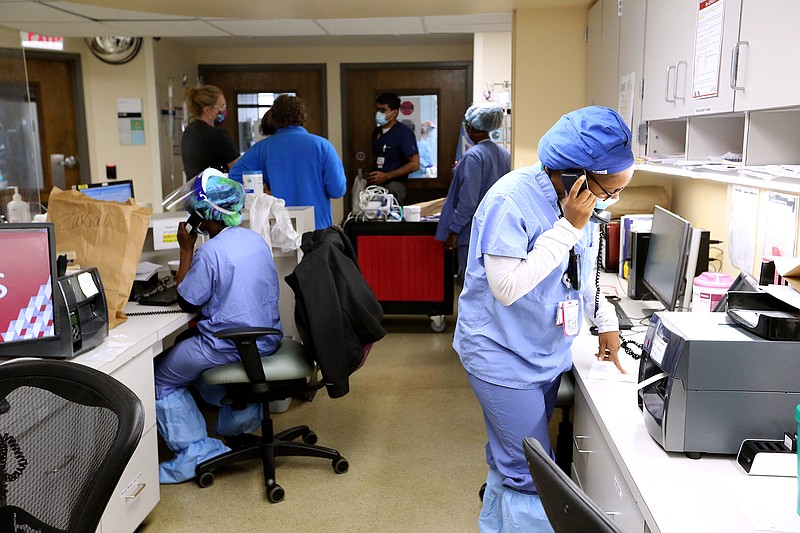Arkansas posted its largest one-day jump in hospitalized covid-19 patients since January on Wednesday as the state's count of cases grew by 466.
Already at its highest level since April 8, the number hospitalized rose by 16, to 92.
The state's death toll from the virus, as tracked by the Arkansas Department of Health, rose by four, to 11,488.
The increase in hospitalized patients was the largest since Jan. 31, about two weeks after the peak of a surge of infections from the omicron variant.
Meanwhile, the increase in cases, while larger than the one on Tuesday, was down from a spike of 556 cases the previous Wednesday.
Except for that increase, however, the 466 cases added on Wednesday was the largest one-day rise since March.
State Epidemiologist Mike Cima said the state's new cases were "probably still a little bit attenuated from the holiday weekend" and that new infections are likely still on the rise.
"Had we not had a holiday this week, we probably would have seen even more cases today than the week prior, or at least something more similar to it," he said.
He said the number of covid-19 patients in the state's hospitals remained at a "very manageable" level, but the increase was "definitely something to pay attention to."
"I still believe that the days of us getting up over 1,000 hospitalizations are not imminent," Cima said.
"I don't think we're in any real danger of taxing our hospital system right now."
At its hospitals in Little Rock and Springdale, Arkansas Children's had nine covid-19 patients on Wednesday, up from two on Tuesday, spokeswoman Hilary DeMillo said.
An uptick in new infections since a few days after Easter has been blamed in part on a more-contagious version of omicron known as BA.2.12.1.
According to U.S. Centers for Disease Control and Prevention estimates updated Tuesday, the strain accounted for 59.1% of new cases nationwide last week, up from 52.9% the previous week.
Health officials have also expressed concern about two other subvariants, BA.4 and BA.5, that caused a recent wave of infections in South Africa.
The CDC estimates indicate those strains and a few others accounted for 6.1% of new cases last week, up from 3.4% the previous week.
Dropping for the second day in a row, the average daily increase in the Arkansas' case count over a rolling seven-day period fell Wednesday to 308, which was down from an average of 320 a day the previous week.
After falling the previous two days, the number of cases in the state that were considered active rose by 120, to 3,880, as new cases outnumbered recoveries.
The total as of Wednesday was still down from a recent high of 4,082 that it reached on Sunday.
After not changing a day earlier, the number of the state's virus patients who were on ventilators rose Wednesday by two, to seven.
The number who were in intensive care, which fell by three on Tuesday, rose Wednesday by six, to 18.
ANTIBODY STUDY
Also on Wednesday, the University of Arkansas for Medical Sciences said another study by Arkansas researchers had found higher rates of covid-19 infection early in the pandemic among Hispanic and Black residents than among non-Hispanic whites.
The study, published in March in the journal Open Forum Infectious Diseases, involved testing 5,804 blood samples for antibodies developed in response to a covid-19 infection.
The samples had been drawn at UAMS in Little Rock, family medicine clinics in Springdale, Fort Smith and Pine Bluff and Health Department local health units around the state for reasons unrelated to covid-19.
Of the samples that were collected from Aug. 15, 2020, to Sept. 5, 2020, 3.8% had antibodies indicating the person had been infected at some point with covid-19.
The percentage was 1.1% among non-Hispanic white patients, 4.8% among non-Hispanic Black patients and 17.6% among Hispanics.
Later in the year, the percentages grew for all three groups.
Of the samples collected from Nov. 7, 2020, to Dec. 19, 2020, the percentages with covid-19 antibodies were 5.5% for non-Hispanic whites, 8.9% for non-Hispanic Blacks and 23.4% for Hispanics.
Overall, 8.1% of the samples from the later period had covid-19 antibodies.
"The higher exposure levels in minorities is not surprising," the study's lead author, UAMS College of Medicine Associate Professor Joshua Kennedy, said in a news release.
"However, the magnitude of the difference in exposure rates is what was surprising, especially early in the pandemic."
Another study, based on a random sample by UAMS researchers of adults from May 2020 to December 2020 who agreed to have their blood tested for covid-19 antibodies, found that Black people were about 40% more likely than non-Hispanic whites to have had an infection, and Hispanics were more than twice as likely.
CASES BY COUNTY
Pulaski County had the most new cases, 96, on Wednesday, followed by Benton County with 59 and Washington County with 30.
The state's cumulative count of cases since March 2020 rose to 843,828.
As a result of what Health Department spokeswoman Danyelle McNeill described as a "data cleanup," the Health Department's count of total vaccine doses that had been administered, as listed on its online coronavirus dashboard, fell Wednesday by 21,514, to 4,072,537.
According to the U.S. Centers for Disease Control and Prevention, 67.1% of Arkansans had received at least one dose as of Wednesday, and 54.8% had been fully vaccinated.
Of those who had been fully vaccinated, 40.2% had received a booster dose.
Among the states and District of Columbia, Arkansas continued to rank 37th in the percentage of its residents who had received at least one dose.
In the percentage who were fully vaccinated, it rose from 47th to roughly tied with Tennessee for 46th, ahead of Louisiana, Mississippi, Alabama and Wyoming.
Nationally, 77.9% of people had received at least one dose, and 66.7% were fully vaccinated.
Of the fully vaccinated population nationally, 46.8% had received a booster dose.
